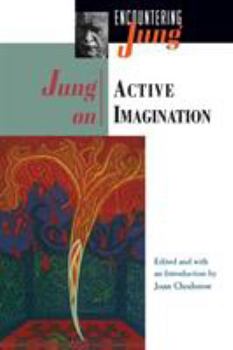Book Overview
All the creative art psychotherapies (art, dance, music, drama, poetry) can trace their roots to C. G. Jung's early work on active imagination. Joan Chodorow here offers a collection of Jung's writings on active imagination, gathered together for the first time. Jung developed this concept between the years 1913 and 1916, following his break with Freud. During this time, he was disoriented and experienced intense inner turmoil --he suffered from...
Format:Paperback
Language:English
ISBN:0691015767
ISBN13:9780691015767
Release Date:July 1997
Publisher:Princeton University Press
Length:208 Pages
Weight:0.68 lbs.
Dimensions:0.5" x 6.1" x 8.9"
Customer Reviews
3 ratings
Carl Jung had an active imagination
Published by Thriftbooks.com User , 15 years ago
pun intended. if you're inclined to believe all of the patient anecdotes that Jung relates (i dont blindly believe what's not independently verified) then Jung wasn't quite as therapeutically helpless as his colleagues in the field of psychotherapy. i found one glaring discrepancy in the patient story behind chapter 6. picture #14 (page 129) is represented as a painting of Fifth Avenue in NYC painted by an American and then current resident of NYC. the problem is that the autos are driving on the wrong side of the street. no American resident of NYC is going to paint Fifth Ave with the cars driving on the left side. someone from Switzerland might. and i feel that the other pictures credited to this patient are too stylistic and design esthetic to be products of what Jung calls the 'unconscious' mind. i think Jung had a very active imagination that may possibly have even factored into his professional papers. (ducking). my opinion is that the reason medication is the mainstay of modern psychiatry is that it's the only treatment available (Jung's included) that's more than rarely effective. and even after rarely illuminating some of a willing patient's darkest psychic areas, psychiatry can't (Jung doesn't even try to) help patients develop a comprehensive, functional set of coping tools. whatever. i'm giving this book 5 stars because the exposition is excellent and his 'active imagination' technique helped me improve my creative output. i write and draw as an outlet, not for the public. Jung had a jaundiced view of artists and "art for art's sake" and advised against using 'active imagination' for that purpose, but i love it for that. that's where it actually works. i keep a journal and log my life, my dreams/daydreams and all ideas. it's great material for creative writing exercises and drawing. 'active imagination' is a great raw creativity tool. as for psychotherapy, even after all of Jung's contributions it's still as helpless as ever.
Everyone should know Jung's work.
Published by Thriftbooks.com User , 15 years ago
As it is the basis for many of the philosophies we have today. Here is the man who investigated the ancient eastern and shamanic philosophies, melded them with his own psychological observations, and changed the course of western thought. The concept of active imagination, a way of tapping creative intuition and allowing inspiration to become conscious, has been tremendously influential and has been endlessly copied and written about. This is the source, or rather, the man who did the most to make these insights respectable within the western tradition. Important and relevant for any creative persons, those involved in meditation, and anyone interested in such subjects.
Active imagination is a must-read for introverts.
Published by Thriftbooks.com User , 27 years ago
If you fit the following profile, then you owe it to yourself to read about active imagination: introvert, deep thinker, and aged in the mid 20s while not yet settling into married life. This book can be looked at as a self-help book if you possess those qualities because it will gently remind you of sources of unhappiness that you would not readily accept consciously as being a valid reason for getting depressed. The danger of ignoring these sources of conflict is that your mind will take over and cope with the use of the imagination leading to fantasies. Order springs out of chaos when you are armed with the knowledge of this book and are at a loss to explain the behavior of yourself and others.





